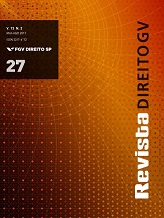Moral & incentives: should corruption whistleblowing be rewarded?
Keywords:
Law and Economics, Social control of corruption, Incentives, Civic duty, MoralAbstract
This article presents an applied mechanism design and a legal analysis of a Bill proposed into law by the Brazilian Federal District House of Representatives in 2013. The Bill offers monetary rewards for citizens that denounce corruption. In our decision-theoretic model, corruption control may give the citizens utility due to their civic responsibility feeling. The main trade-off brought about by the reward mechanism is that, by receiving compensation, citizens’ civic impulse to dedicate effort to curb corruption may be reduced. However, our model shows that if society is heterogeneous enough, the monetary reward motive prevails and the Bill fosters social involvement. Furthermore, we propose a mechanism that transforms the moral dissatisfaction of receiving money into a moral incentive to dedicate to corruption control. Finally, a careful analysis of the Law and of a series of case studies in Brazil suggest that such a mechanism does not violate the Constitution and, furthermore, has actually been used under different forms in the Brazilian legal system.Downloads
Published
2017-07-28
Issue
Section
Artigos


